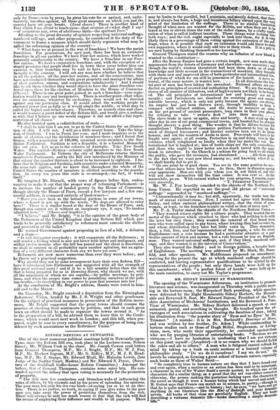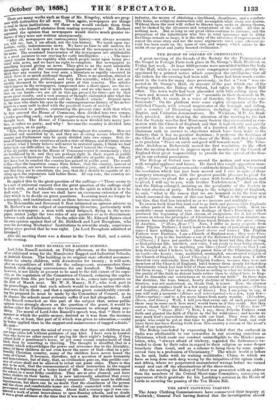MR. SIDNEY HERBERT AT WARMINSTER.
The opening of the Warminster Athenaeum, an institution to promote literature and science, was inaugurated on Thursday with a public meet- ing in the lecture room ; the Marquis of Bath presiding, while speeches were delivered by the Right Honourable Sidney Herbert, the Honour- able and Reverend S. Best, Mr. Edward Baines, President of the York- shire Association of Mechanics' Institutions, and the Reverend A. Fane, Vicar of Warminster. Mr. Sidney Herbert delivered a speech at once animated, genial, and searching in thought. He touohed upon the ad- vantages of such associations in cultivating the faculties of man, taking his illustration from " the popular story of Eyes and no Eyes' by Mr. Trimmer." [A mistake : it is in Mrs. Barbauld's Evenings at Horne, and was written by her brother, Dr. Aiken.] While commending la- borious studies such as those of Hugh Miller, Stephenson, or Living- stone, men, who made their opportunity, he contended against these who are for purging libraries of entertaining books. "Because we are virtuous,—I have no hesitation in confessing that I am not virtuons The opening of the Warminster Athenaeum, an institution to promote literature and science, was inaugurated on Thursday with a public meet- ing in the lecture room ; the Marquis of Bath presiding, while speeches were delivered by the Right Honourable Sidney Herbert, the Honour- able and Reverend S. Best, Mr. Edward Baines, President of the York- shire Association of Mechanics' Institutions, and the Reverend A. Fane, Vicar of Warminster. Mr. Sidney Herbert delivered a speech at once animated, genial, and searching in thought. He touohed upon the ad- vantages of such associations in cultivating the faculties of man, taking his illustration from " the popular story of Eyes and no Eyes' by Mr. Trimmer." [A mistake : it is in Mrs. Barbauld's Evenings at Horne, and was written by her brother, Dr. Aiken.] While commending la- borious studies such as those of Hugh Miller, Stephenson, or Living- stone, men, who made their opportunity, he contended against these who are for purging libraries of entertaining books. "Because we are virtuous,—I have no hesitation in confessing that I am not virtuons
on this point myself—(Laughter)—it is no reason why we should forbid the cakes and ale to others." A man who is fatigued cannot refresh his mind by taking up a book on conic sections or a learned volume of philosophic study. "Do we do it ourselves ? I say we do not" On novels he enlarged, as forming a great school of human nature, espeetallY such books as those of Walter Scott-
" So completely true to human nature are they that I have heard o'er and over again, when a motive or an action has been said to be unnatural, a character in one of Sir Walter Scott's novels quoted, in which one of the characters did a similar thing, as a proof that tho ant was either correct fa otherwise, the person making the quotation looking upon the character t!! the novel as though it were a human being which had moved and acted: M. Guizot says that France can match us in science, in iii that he is quite mistaken,—and in history ; but, he says, "we have not pt anything in our literature like the Heir of Bedell e and your domestp
meats
novels. All books of that class are peculiarly English. They are bon?
poetry,—though describing a virtuous domestic life—books describing a simple do life."
There are many works such as those of Mr. Kingsley, which are preg- nant with instruction for all men. Then again, newspapers are things to read in these institutions. Of those who would exclude them from the table, who himself abstains from reading newspapers ? Mr. Herbert apressea the opinion that newspapers would derive much greater in- fluence if they were not written anonymously. ,4 After all, newspapers are contemporary history—not always accurate sal', but, I am afraid, not the lees history. We insist upon ini-
tial will
lesiste, early, instantaneous news. We have no time to sift matters for
-ourselves, and we look upon it as the business of the newspapers to teil us tbe news. The occasional inaccuracies of the newspapers are attributable
in a great measure to our craving for early intelligence The lane- asacy results from the rapidity with which people insist upon being pro- vided with news, and we have no right to complain. But newspapers do mottling beyond giving us news. They give to 1113 the most admirable giseussion.s upon all the contemporaneous questions of the day. I do not think that any country has ever seen a literature so rapidly executed in shish there is so much profound thought. There is no question, abroad or at home, no question political, and very few scientific, which is not ad- mirably discussed in the newspaper press of this country. The articles which appear in the newspapers, compressed into a short space, are the re- sult of much reading and of much thought ; mid we who have not much time on our hands—we are all in this age pressed for time—get by that means great results, and a vast amount of thought elaborated into what the Lancashire manufacturers would call the finished article.' Depend upon it, the man who shuts his eyes to the contemporaneous history of the news- papers is a man unfit to deal with the practical wants of society."
Be adverted to politics, contrasting the present time with that when be first entered the House of Commons, then divided into two camps, a leader guarding each ; each party acquiescing in everything the leader thought best. The House of Commons is now divided into many par- ties, or rather no party, and why ? because the country is divided into mane parties, or no party.
"{ow, there is great complaint of this throughout the country. Men are disturbed and unsettled by it, mid their-are devising means whereby the country and Parliament may be again divided into two camps. But, in- stead of lamenting the existence of such a state of things, and devising means to restore what I firmly believe will never be restored again, I think we had better look our difficulties in the face. I don't lament the change. Many of the old public men in the House of Commons regret it enormously ; they are bewildered by it, and they are perhaps right in their regret as public men, because it increases the trouble and difficulty of public men. But all they have lost in comfort the country has gained in public good. The result is this—that the impulsion comes from below, that the country, instead of being partisans, are now become a calm, reasoning jury, and it is necessary now that they are to constitute the jury that they should be capable of de- ciding upon the arguments laid before them. At any rate, the country are gainers by the change."
He applied this to the great question of the suffrage—" There seems to be a sort of universal consent that the great question of the suffisge shall be dealt with, and a tolerable consent as to the spirit in which it is to be dealt with." In that case we shall have an enormous extension of the Jury which is to decide on great questions. Learning must no longer be a monopoly, and institutions such as these become invaluable.
The Honourable and Reverend S. Best intimated an opinion adverse to Br. Herbert's on the subject of entertaining literature, particularly with regard to newspapers : a man with mind fatigued, flying to the news- paper, cannot judge the two sides of any question so as to discriminate between truth and falsehood. On the other side Mr. Edward Baines cited Iris own opinion against that of Dr. Birkbeck and Lord Brougham, who were for devoting Mechanics' Institutions to scientific study, experience having since proved that he was right. [As Lord Brougham admitted at Liverpool.] After the meeting there was a dinner in the Town Hall, and a soirée in the evening.



























 Previous page
Previous page